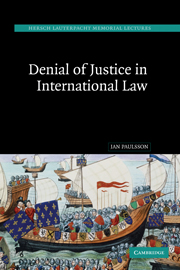Book contents
- Frontmatter
- Table of Contents
- Acknowledgements
- Authorities
- Abbreviations
- 1 The renaissance of a cause of action
- 2 The historical evolution of denial of justice
- 3 Three fundamental developments
- 4 The modern definition of denial of justice
- 5 Exhaustion of local remedies and denial of justice
- 6 Denial of justice by outside interference
- 7 Denial of justice by the decision-maker
- 8 Remedies and sanctions
- 9 The menace of ‘obscure arbiters’?
- Bibliography
- Index
2 - The historical evolution of denial of justice
Published online by Cambridge University Press: 29 July 2009
- Frontmatter
- Table of Contents
- Acknowledgements
- Authorities
- Abbreviations
- 1 The renaissance of a cause of action
- 2 The historical evolution of denial of justice
- 3 Three fundamental developments
- 4 The modern definition of denial of justice
- 5 Exhaustion of local remedies and denial of justice
- 6 Denial of justice by outside interference
- 7 Denial of justice by the decision-maker
- 8 Remedies and sanctions
- 9 The menace of ‘obscure arbiters’?
- Bibliography
- Index
Summary
Absence of a universal standard
Denial of justice is an elusive concept. Freeman called it that ‘innocent-appearing phrase’, only to deplore the ‘chaotic heterogeneity’ of views as to its proper scope. There are two readily apparent reasons why this should be so.
The first is a matter of definition; all kinds of injustice could be referred to as denial of justice, but then the expression could be invoked to complain about the disposition of any grievance. It would thus lack any particular meaning and lose all usefulness. The malleability of the words denial of justice have led states to adopt narrower or broader definitions, as their interests dictate.
The other reason is that some national laws contain their own long-established doctrines of denial of justice, defined in a manner different from that of international law, and sometimes inconsistent with it. These concepts were grounded in the commoners' historical right to demand that local lords hear petitions. They have endured in the prohibition against non liquet. The same requirements exist in international law, but the latter certainly requires more. National laws generally demand nothing more than some kind of disposition of the plaint. Even a legally unfounded judgment of inadmissibility is not deemed to constitute a denial of justice, but would stand or fall depending on the availability of other grounds of appeal.
- Type
- Chapter
- Information
- Denial of Justice in International Law , pp. 10 - 37Publisher: Cambridge University PressPrint publication year: 2005



